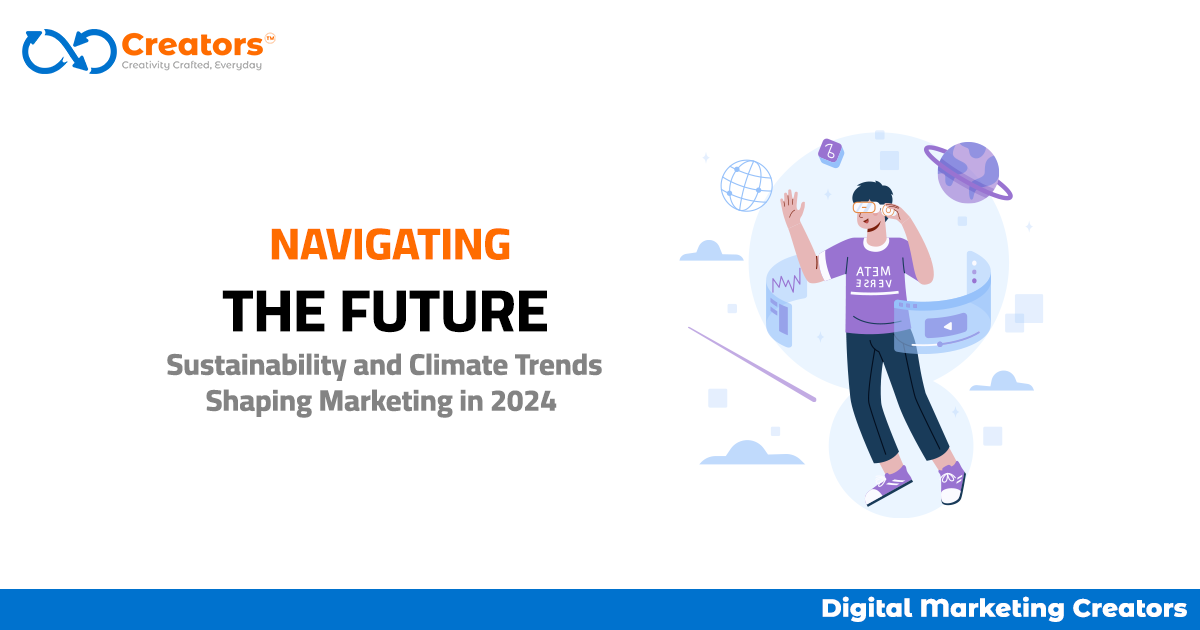Sustainability and Climate Trends Shaping Marketing in 2024
Welcome to 2024, a year where sustainability and climate trends are no longer niche concerns but core drivers of business success. This report, drawing insights from the comprehensive analysis of MSCI’s “Sustainability and Climate Trends to Watch 2024” paper, dissects these critical trends and their implications for marketing strategies. Whether you’re a seasoned marketer or a business owner taking your first steps into sustainability, this report empowers you to make informed decisions, build resilience, and thrive in the years to come.
Methodology:
This report builds upon the rigorous research conducted by MSCI, which utilizes a combination of methods:
- Expert Interviews: Insights from leading sustainability and climate professionals provide practical industry perspectives.
- Academic Research: A review of relevant academic literature establishes theoretical foundations and best practices.
- Data Analysis: Quantitative data informs trends and predictions.
While limitations such as inherent biases in interviews or data sources may exist, this report strives to present a balanced and comprehensive overview.
Key Findings:
1: Extreme Weather Hits Home and Work:
Finding: Extreme Weather Hitting Homes and Workplaces: Rising Costs, Disrupted Lives, and New Investment Risks
Insight: Climate change’s impact is no longer abstract, with extreme weather events affecting homeowners, businesses, and workers directly. Rising insurance costs, productivity losses, and labor unrest pose economic and social challenges, creating new investment risks and opportunities.
Marketing Recommendations:
- Highlight climate resilience solutions: Showcase your products or services that help individuals and businesses adapt to and mitigate climate risks, such as sustainable building materials, heat-resistant infrastructure, or risk management tools.
- Advocate for policy solutions: Support and contribute to policy initiatives that address affordability of climate insurance, worker wellbeing in extreme heat, and infrastructure resilience.
- Target impacted industries: Tailor your messaging to industries facing specific climate vulnerabilities, such as logistics, manufacturing, or agriculture, offering practical solutions.
- Partner with sustainability experts: Collaborate with organizations specializing in climate risk analysis and workforce adaptation to enhance your credibility and impact.
Example:
- Allianz launched a “Green Home” insurance product that rewards policyholders for adopting sustainable home features like energy-efficient appliances and solar panels.
By demonstrating both awareness and proactive solutions to climate challenges, you can position yourself as a responsible and relevant partner for individuals, businesses, and investors navigating this evolving landscape.
2: Sharper Spotlight on Corporate Governance: Investors Take Control
Finding: Increased regulatory scrutiny and improved transparency around audit practices and corporate governance raise questions about company oversight and empower investors to take a more active role.
Insight: Investors now have access to more data on audit quality and board governance, allowing them to assess risk at individual companies and influence decision-making through proxy voting and investment choices.
Marketing Recommendations:
- Emphasize transparency and robust governance: Showcase your commitment to clear communication, adherence to best practices, and independent board oversight.
- Engage with investors directly: Proactively provide detailed information on governance structures, audit processes, and risk management strategies.
- Embrace shareholder activism: View engagement with investors as an opportunity for improvement and collaboration, addressing their concerns head-on.
- Partner with governance experts: Collaborate with organizations specializing in corporate governance to enhance your practices and stay ahead of regulatory changes.
Example:
- Unilever: This multinational company actively engages with investors on sustainability and governance issues, publishing detailed reports and fostering open dialogue. They also implemented board refreshment policies and actively solicit shareholder feedback.
By demonstrating transparency, prioritizing sound governance, and embracing investor engagement, you can build trust and attract investors seeking responsible and well-managed companies in an era of heightened scrutiny.
3: Managing AI: Don’t Forget the Basics in the Generative AI Rush
Finding: While generative AI promises revolutionary advancements, responsible development requires revisiting and strengthening fundamental risk management practices. Data privacy demands greater attention with evolving regulations and the potential for misuse.
Insight: Companies developing and deploying generative AI must build upon existing risk management best practices, especially regarding data privacy. Addressing regulatory compliance, obtaining clear user consent, and upholding ethical data practices are crucial for responsible and sustainable AI adoption.
Marketing Recommendations:
- Highlight your commitment to data privacy: Showcase your compliance with current regulations and proactive efforts to address emerging privacy concerns in generative AI development.
- Emphasize transparency and user consent: Explain how you collect, use, and protect user data in the context of generative AI applications, ensuring clear opt-in and control mechanisms.
- Prioritize ethical development: Promote your ethical principles governing AI development, addressing potential biases, and ensuring algorithms are used responsibly.
- Partner with privacy experts: Demonstrate your commitment to data security and privacy by collaborating with trusted organizations in this field.
Example:
- IBM Watson Health: This leader in healthcare AI emphasizes responsible data practices in its solutions. They offer transparency regarding data collection and usage, prioritize user consent, and have established ethical guidelines for AI development in the healthcare sector. Additionally, they actively participate in industry discussions and initiatives promoting responsible AI development.
By emphasizing your commitment to ethical data practices, responsible development principles, and compliance with evolving regulations, you can build trust with users and stakeholders in the rapidly evolving landscape of generative AI.
4: Supply-Chain Due Diligence Becomes the Law: From Disclosure to Action
Finding: Governments are increasingly introducing stricter regulations requiring companies to actively manage environmental and social risks throughout their supply chains, moving beyond mere disclosure. Traceability and due diligence practices are now critical to avoid hefty fines and reputational damage.
Insight: Investors and companies need to proactively adapt to these evolving regulations, investing in robust traceability solutions and due diligence processes to ensure ethical and sustainable supply chains.
Marketing Recommendations:
- Highlight your commitment to responsible sourcing and ethical practices: Showcase your proactive efforts in mapping and monitoring your supply chain, addressing environmental and social risks.
- Offer transparent reporting: Publish transparent reports detailing your due diligence processes, progress made in traceability, and actions taken to address identified risks.
- Invest in innovative solutions: Partner with tech startups and industry leaders to leverage technology like blockchain and satellite monitoring for effective traceability.
- Collaborate with stakeholders: Advocate for industry-wide initiatives and collaborate with regulators and NGOs to create effective and harmonized standards for responsible supply chain management.
Example:
- Unilever: This FMCG giant has implemented a comprehensive Sustainable Living Plan, addressing deforestation, ethical sourcing, and improving working conditions throughout its supply chain. They actively engage with stakeholders, publish detailed sustainability reports, and invest in innovative traceability solutions.
By demonstrating your commitment to ethical and sustainable supply chain practices, you can build trust with investors, attract environmentally and socially conscious consumers, and mitigate regulatory risks in the evolving legal landscape.
5: More Climate Disclosures, But Buyer Beware: Scrutinize the Fine Print
Finding: Regulatory push for mandatory climate disclosures is surging, raising hopes for better data and investment decisions. However, nuances in implementation and potential “orphaned emissions” hidden in reports highlight the need for careful assessment.
Insight: Investors need to actively scrutinize disclosures beyond headline numbers, looking for consistency across regions, accounting methodologies, and alignment with stated decarbonization plans.
Marketing Recommendations:
- Emphasize your commitment to transparent and comprehensive climate reporting: Showcase your adherence to ISSB standards, clarity in accounting methodologies, and avoidance of “orphaned emissions.”
- Offer tools and resources: Provide investors with guidance on interpreting disclosures, analyzing hidden risks, and comparing companies effectively.
- Advocate for harmonized standards: Support global efforts to standardize climate reporting frameworks and ensure meaningful comparability across markets.
- Partner with sustainability experts: Collaborate with organizations specializing in carbon footprint analysis and greenwashing detection to enhance your disclosure practices and investor education.
Example:
- Ørsted: This renewable energy leader sets a standard for transparent reporting, adhering to ISSB standards, disclosing emissions comprehensively across the value chain, and actively engaging with investors on climate-related risks and opportunities.
By demonstrating leadership in transparent and comprehensive climate disclosures, you can build trust with investors, attract climate-conscious capital, and navigate the evolving regulatory landscape with confidence.
6: EU Regulation Creates Unexpected Hurdle for Emerging Market Climate Finance
Finding: The EU’s Sustainable Finance Disclosure Regulation (SFDR) poses an unintended obstacle for directing much-needed climate finance to emerging markets due to their companies often failing to meet the regulation’s high sustainability standards. This potentially hinders global progress towards net-zero goals.
Insight: While the SFDR aims to promote sustainable investments, its “do no significant harm” (DNSH) principle, based on specific indicators, disproportionately disadvantages emerging markets compared to developed economies.
Marketing Recommendations:
- Advocate for balanced and inclusive regulations: Support initiatives that refine the SFDR’s DNSH criteria to accommodate developing economies’ context and promote responsible investment practices without hindering access to critical climate finance.
- Highlight solutions for emerging markets: Showcase your expertise in identifying and investing in companies within emerging markets that demonstrably contribute to a sustainable future, even if they don’t fully meet current EU standards.
- Partner with stakeholders: Collaborate with regulators, investors, and development organizations to bridge the gap between global sustainability standards and the realities of emerging markets.
- Communicate the global implications: Emphasize the negative impact of excluding emerging markets from sustainable finance flows on achieving global climate goals and achieving a just transition.
Example:
- IFC Emerging Markets Climate Action Fund: This fund invests in climate-focused projects in developing countries, showcasing commitment to both addressing climate change and supporting economic development in emerging markets. It actively engages with policymakers and industry stakeholders to promote enabling environments for sustainable investments.
By highlighting the importance of inclusive regulations, showcasing your commitment to responsible investment in emerging markets, and advocating for collaborative solutions, you can position yourself as a leader in bridging the gap between global sustainability goals and the realities of developing economies.
7: Private Debt in the Climate Transition: Unmasking Risks and Opportunities
Finding: Contrary to popular belief, private debt may not be the haven for “dirty” assets previously divested from public markets. Initial data suggests private equity funds could even have lower carbon intensity than public equities. However, deeper analysis reveals different levels of climate-transition risk within private debt itself, with distressed debt potentially facing the highest impact.
Insight: Transparency and data accessibility are crucial to dispel myths about private debt and accurately assess its climate-related risks and opportunities. Investors need data beyond carbon intensity metrics to make informed decisions.
Marketing Recommendations:
- Highlight transparency and data-driven approach: Emphasize your commitment to data accessibility and robust methodologies in assessing portfolio carbon intensity and transition risks.
- Showcase impact beyond pure numbers: Go beyond carbon intensity scores and illustrate how your investments translate to real-world positive impacts on emissions reduction and green solutions.
- Target climate-conscious investors: Tailor your messaging to resonate with investors concerned about climate risks and seeking opportunities to contribute to a sustainable future.
- Partner with sustainability experts: Collaborate with credible organizations to enhance your data analysis, risk assessment, and impact measurement capabilities.
Example:
- InfraRed Capital Partners: This private equity firm proactively discloses portfolio carbon footprint data and publishes sustainability reports detailing their approach to managing climate risks and opportunities. Additionally, they actively engage with industry groups and initiatives promoting responsible investment practices.
Effectively communicate your commitment to climate action and responsible investing, using data and real-world examples to build trust and attract climate-conscious investors.
8: Investing in Nature: Measuring Impact for Sustainable Returns
Finding: Biodiversity loss presents significant financial risks alongside climate change, driving investor interest in nature-based solutions. Measuring portfolio impacts on nature remains challenging due to a lack of standardized metrics, hindering effective risk management and investment opportunities.
Insight: Developing a common framework for measuring biodiversity impact is crucial for investors to manage risks, compare opportunities, and drive positive change.
Marketing Recommendations:
- Advocate for standardized biodiversity metrics: Support and contribute to initiatives developing consistent measurement frameworks for biodiversity impact.
- Highlight your commitment to nature-positive investing: Showcase your efforts to measure and manage portfolio impacts on biodiversity, going beyond traditional carbon-focused metrics.
- Offer nature-based investment solutions: Develop or promote investment products that support ecological restoration, conservation projects, and sustainable resource management.
- Partner with sustainability experts: Collaborate with organizations specializing in biodiversity measurement and assessment to enhance your impact analysis and investment strategies.
Example:
- BNP Paribas Investment Partners: This asset manager launched the “BNP Paribas Biodiversity Engagement & Impact UCITS ETF,” which invests in companies actively engaged in preserving and restoring biodiversity while offering financial returns. Additionally, they actively participate in initiatives like the Taskforce on Nature-related Financial Disclosures (TNFD) to promote standardized reporting and investment practices.
By emphasizing your commitment to measuring and addressing biodiversity impacts, you can attract investors seeking sustainable returns and contribute to a future where nature thrives alongside financial success.
As these trends unfold, sustainability and climate considerations become non-negotiable for responsible brands. But crafting a powerful, impactful strategy takes time and expertise. Don’t go alone. That’s where we come in.
Digital Marketing creators offers full integrated marketing services, where our sustainability experts will work together with you to develop a winning climate-conscious marketing strategy tailored to your unique brand and audience, identify your sustainability strengths and opportunities for improvement, explore innovative tactics and tools to engage conscious consumers and Craft messaging that resonates with today’s values and builds trust.
Ready to embrace sustainability and become a leader in this pivotal era? Contact us directly to schedule your personalized consultation. Together, let’s build a greener and more resilient future.






